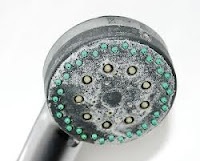Call Spartan Plumbing today - 541 500 1787 - for fast, friendly #plumbing services at your home or business.
About 85% of households have hard water. If your home has water, you could be spending your hard-earned cash on expensive appliance repairs and trying to get everything clean. Hard water contains excessive amounts of minerals such as magnesium and calcium, that result in buildups and deposits that affect everything that touches the water, including your health, your hair, your clothing and your dishes. It also takes a toll on your plumbing system.
Symptoms of Hard Water
If you have hard water, you may notice:
● Frequently clogged faucets, shower heads and pipes.
● Leaky pipes.
● Yellowed laundry that should’ve been white.
● Reduced cleaning and foaming of detergents and soaps.
● Soapy residues on shower doors and dishes.
● Calcium deposits or rings on dishwashers, sinks and tubs.
Hard water usually contains more than 3 grains of minerals per gallon, and the harder the water, the higher the possibility of problems.
How Hard Water Costs You Hard-Earned Money
Hard water takes a toll on your energy bill, your pipes, fixtures and appliances. Here’s how:
1. Hard water takes more energy to heat. It takes 8% more energy to heat water for every extra 20 mg of minerals in the water.
2. Cleaning with hard water requires more soap, which costs more. Hard water does not react effectively with soap, thus requiring more soap to clean your dishes, wash your body and wash your hair. It also tends to leave soap scum on your bath and shower, and spots on the dishes, which takes more time and cleaning materials to clean thoroughly.
3. Limescale in hard water clogs up your pipes and shower heads. When soap scum collects on the sink and tub, it causes water to arrive in the faucets more slowly, and the sinks and tubs will drain slower too. Clogged pipes mean more frequent plumbing call outs.
4. Hard water can break your water heater. When limescale builds up in your boiler or water heater, it can dramatically reduce the efficiency of the heater. Since the system is pressured, the hard water can cause your boiler to fail, which is not a cheap plumbing repair.
How to Soften Hard Water
The simplest fix for hard water, is to purchase or rent a water softener. Two basic types are available on the market today, namely a traditional water softener that uses salt, and a water conditioner or descaler that doesn’t use salt. According to Mayo Clinic, it is safe for people on low-sodium diets to use water softeners, as the system adds a miniscule amount of salt to the water.
Here are some things you should consider when you decide to buy a water softener:
#1 – Should you rent, or should you buy? Different water softeners have different features and prices range dramatically. If you don’t want to buy one, you can rent one at a monthly fee. Some rental companies charge for installation, while others do it for free. When you buy a water softener, be sure to have it professionally installed.
#2 – Research the different types of water softeners available and choose the one that serves your purposes best. Consider the available features, and check whether they offer a money-back guarantee.
#3 – Work with a company whose technicians are Water Quality Association certified.
#4 – Be sure to educate yourself and your family on the unit’s maintenance instructions, and be sure to follow them closely.
Do you think you have hard water and want to confirm it? You can buy test kits from most home and garden stores, or you can call Spartan Plumbing. We can also help you choose the right unit and perform the water softener installation.
Tanya Klien


No comments:
Post a Comment